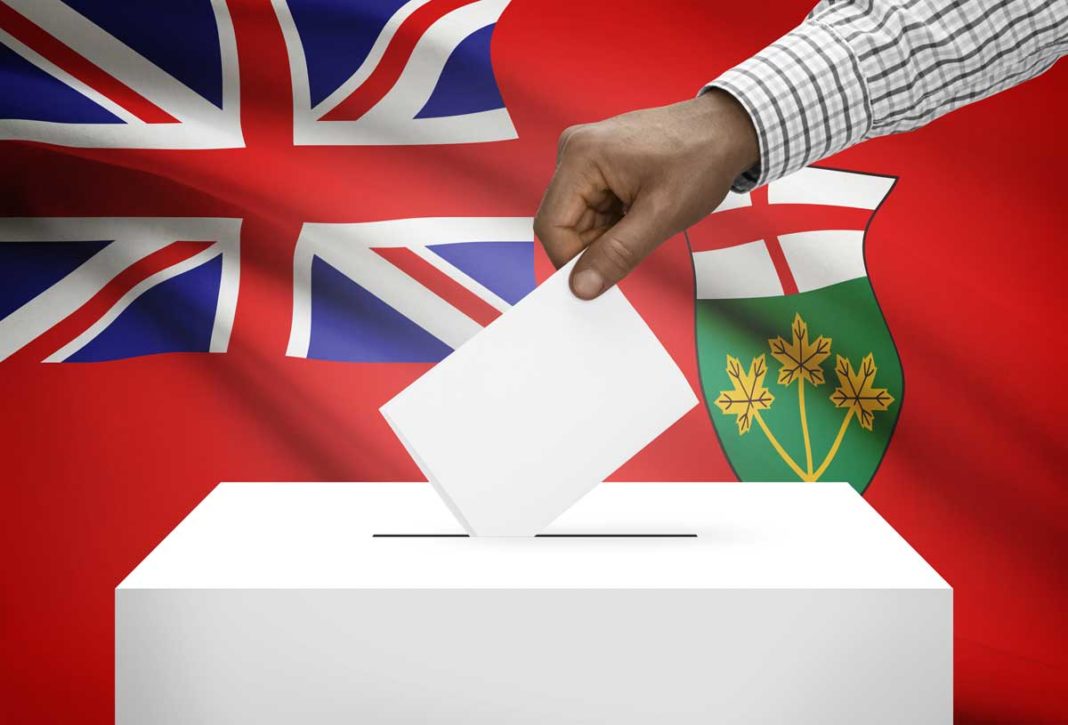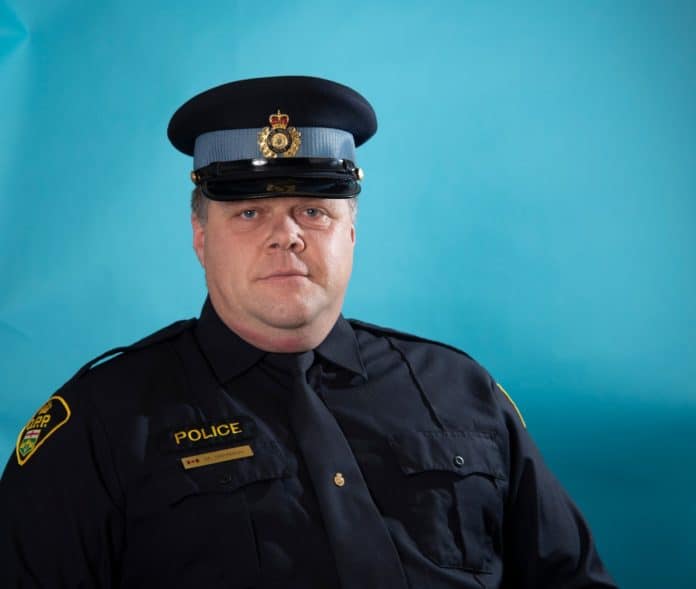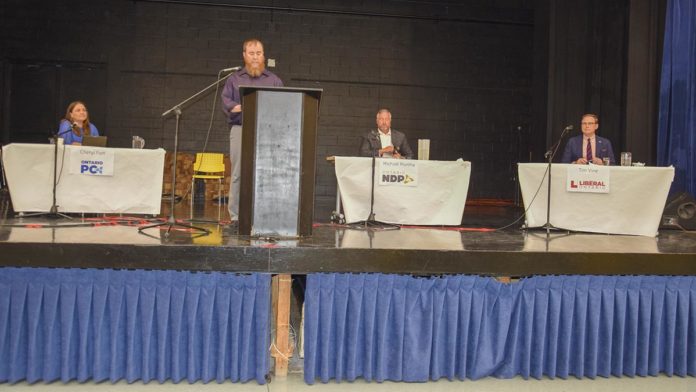As is Expositor tradition during the leadup to the provincial election, this newspaper poses a question each week to the candidates. The question, and the candidates’ responses, follow here:
The mental health and addictions crisis has worsened significantly since the start of the pandemic. More people have turned to drug use to cope with depression, anxiety and isolation. For example, there was a 79 percent increase in the number of opioid-related deaths between February 2020 and December 2020, while the number of all opioid-related deaths per 100,000 across all public health units in the province increased from 7.9 to 14 in the first half of 2021.
What is your plan to address the underlying causes of this crisis, including income, housing and employment, and how does this inform the expansion of harm reduction and treatment programs in Ontario?
Tim Vine, Liberal Party
I would like to start by acknowledging that the opioid crisis is a long-standing crisis that has only been worsened by the pandemic. We know that addiction is a medical condition that is exacerbated by many underlying root causes. Addressing the opioid crisis requires that we deal with these complex and interconnected root causes. In addition to direct investments in harm reduction and mental health and addictions treatments, the Ontario Liberal Party has a comprehensive plan to make housing more affordable and increase its availability, to support economic dignity and ensure dignity in the workplace.
In order to save lives and address the most acute end of this problem, Ontario Liberals plan to lift the cap on safe injection sites and put 300 million into supporting front line harm reduction including fentanyl testing strips and clean drug supplies, while making them more available at places like pharmacies. We will also reconvene the Opioid Task Force, that has not met in the four years of a Ford PC government, in order to give further expert advice that will support government response on this crisis. To support mental health and addictions treatment, we will reverse the Ford government’s cuts and invest an additional $3 billion. We will increase the number of mental health and addictions professionals in emergency rooms and ensure they are ready to respond to emergency calls, making sure the right people are intervening at the appropriate times.
Yet, it’s not just enough to pull people out of the river we must go upstream and ensure that the guardrails are maintained to keep people from falling in. To do this, an Ontario Liberal government would create 15,000 more mental health and addictions supportive homes as part of the 138,000 more deeply affordable housing units that we would build. We will invest $100 million in the co-operative home sector, working with local municipalities and District Service Boards. We would also reinstate the rent control that has eroded under the PCs and impose a vacant home tax to get more homes on the rental market. We know that having a safe and affordable home is the first important step of support.
We also know that there are too many people falling behind economically, especially those living on fixed incomes and social supports which can lead to hopelessness and turning to escape. Ontario Liberals would increase ODSP and OW by 20 percent, raising the claw back to $6,000/year. For our most vulnerable seniors we would increase the provincial top up of OAS by $1,000/year. We would keep more money in people’s pockets with our buck-a-ride, province wide transit plan that includes Ontario Northland, and eliminate HST on prepared foods up to $20.
Not being valued in the workplace can also lead to hopelessness. The dignity of workers needs to be valued and we know that this starts with a fair wage. Which is why Ontario Liberals would immediately increase the minimum wage to $16/hr and establish a framework for a regional living wage. We would ensure an affordable and portable benefits plan for all workers that would include mental health coverage, require 10 paid sick days and eliminate Bill 124 because everybody needs economic dignity and we know that burnout can contribute to addictions.
Our Ontario Liberal plan is responsible and robust, and provides the badly needed investments for the wrap around supports that are key to addressing the opioid crisis we find ourselves in, as well as the root causes. You can find more details on our plan at ontarioliberal.ca/platform/ On June 2, the choice is yours.
Ron Koski, New Blue Party
Let’s start with the fact that we’re all opioid-dependent. For the fortunate ones with rewarding relationships, meaningful employment and engaging interests, the opioids we’re dependent on are endogenous, they’re endorphins and enkephalins we create naturally and they’re critical for the formation of our overall wellbeing and maintenance of social bonds connecting us to friends and family.
We can’t rehabilitate or arrest our way out of this when the underlying cause is a crisis of meaning, lack of meaningful relationships and unresolved trauma. What gambling addiction, alcohol and opioid addiction all have in common is their relationship to endorphin-mediated feelings of wellbeing, feelings that our opioid systems have evolved in part to fuel social connection.
We have a provincial PC government led by Doug Ford and championed in our riding by Cheryl Fort, who have diverted $1 billion tax dollars to the gambling industry. Sorry, but enabling alcohol to be served at 9 am in casinos and gifting a $500 million online-gambling licence to the Toronto Star is not going to save us. It’s only going to compound a systemic problem.
What did we think would happen when the provincial PCs and the NDP-Liberal coalition shut down small businesses, the largest employment sector of our economy and mandated isolation, while launching divisive campaigns to coerce people into compliance and compel them into vaccination with the threat of job loss or travel restriction?
Ask yourself how many people you know got vaccinated to keep their jobs or travel to a friend’s wedding? With the millions of dollars spent mishandling this situation, how many new hospital beds have you seen in our riding? How many new doctors and nurses? Depression, anxiety, and isolation are a given in this environment. No amount of CERB is going to alleviate it.
What the Ford-PCs did was compound multivariate problems with short-term politicized solutions. Thousands of nurses and numerous doctors across Ontario were fired for conscientiously objecting to the government’s approach to COVID-19. In the words of Doris Grinspu, CEO of the Registered Nurses Association of Ontario, “They’re feeling overstressed, but more importantly… they’re feeling extremely, extremely abandoned by this Premier.”
We could start by reinstating them and rescinding Doug Ford’s $500 million gift to the Toronto Star and investing it back into the doctors and nurses we need to clear the backlog impeding people’s lives.
We could also help alleviate purchasing pressure by reducing the HST from 13 percent to 10 percent and cutting out the misdirected carbon tax. Two commitments of seven that are built into the New Blue platform.
Any solution we invest in needs to help people rebuild relationships, establish social connections, and work through unresolved trauma. Admittedly I’m not providing an absolute answer here, but I am providing an approach.
As the first party to field a full slate of 124 candidates, The New Blue party of Ontario is building a powerful new voice in provincial politics. One that is standing up for you and that’s why I’m running. Join us at www.newblueontario.com, become a member, vote, volunteer if you can, and be part of a movement working to bring sound, sensible politics back to Ontario.
Cheryl Fort, Progressive Conservative Party
The opioid crisis is an urgent health crisis that requires a compassionate and coordinated response. Ontarians need a mental health and addictions system that effectively addresses their needs with safe, evidence-based care.
Since 2019, our PC government has made yearly investments of almost $93 million in addiction services and supports. Last year we announced almost $32 million in funding for substance use services including: bed-based services for those in need of high-intensity supports; community-based addictions services; and access to addiction medication.
Our PC team also required employers with a known risk to provide a naloxone kit and training in workplaces where overdoses are a potential hazard.
Ontario’s economy is getting back on its feet as the province reopens, but we need to ensure workers continue to be supported, especially in hard-hit sectors and the most vulnerable.
This is why we are raising the minimum wage to $15.50 per hour as of October 1, 2022 and to remove the special minimum wage rate for liquor servers.
We also continue to support households with the Ontario Electricity Rebate for residential customers, small businesses and farms. And why we introduced and are expanding the LIFT tax credit for 700,000 more people who had fallen behind, expanded the CARE tax credit for families and continued to keep energy costs low.
The PC team believes that Ontarians of all ages should be able to access high-quality and evidence-based mental health and addictions care. That is why we are the first government in Ontario’s history to create a ministerial department for mental health and addictions. We are getting it done by investing $3.8 billion over 10 years in support of the Roadmap to Wellness, our comprehensive plan to address the mental health and addiction needs of all Ontarians. This plan needs to be championed for our riding and as your MPP I am willing to do that and get it done for our families and loved ones so we stop experiencing needless deaths, sadness and loneliness due to mental health challenges and addictions.
Since the release of the Roadmap to Wellness, we’ve invested over $40 million in new annual funding to address mental health and addiction needs across Northern Ontario.
Through Budget 2022, we invested an additional $204 million in net new annualized funding to address mental health and addiction needs across the province. This brings our total investment to $729 million.
This includes funding for four new mobile mental health clinics to serve remote, rural and unserved or underserved regions across the province.
We need to ensure we have an MPP at the elected table to ensure that this plan is fully implemented in our riding for the sake of family, friends and loved ones.
This is a complex and comprehensive challenge that needs addressing from multiple angles and that’s why we have announced $3 billion in funding to help sustain, repair and grow community housing and address homelessness in Ontario. This is just part of our PC team’s commitment to ending homelessness. We also implemented “by-name lists,” which are a real-time list of people experiencing homelessness that includes detailed information about the needs of each person to improve their access to supportive housing.We will continue to get it done and make investments in this important file and we work to end homelessness.
I am confident that by working together with the elected government we can accomplish much in this next term to save many lives and this is one of the main reasons my name, Cheryl Fort, is on the ballot, to help Algoma-Manitoulin people have thriving and healthy lives.
Michael Mantha, NDP incumbent
The overdose and addiction crisis in Algoma-Manitoulin and other Northern regions has reached crisis levels. I have raised this issue on several occasions at Queen’s Park, introduced petitions, and supported motions to officially declare the overdose epidemic a public health emergency. Likewise, the province is also experiencing an emergency-level crisis regarding mental health. The situation has escalated to the point that the provincial government needs to take immediate action, including full-scale treatment and support for suffering individuals.
Recently, Algoma-Manitoulin candidates were asked to share their plans to address mental health, addictions and overdose deaths in this riding; I made my position clear. It is my hope never again to have to attend a march in a community where someone died because they could not get the help they needed in time.
This province is late to the table to treat this crisis with the gravity it deserves. Of course, we should already have in place crisis responses and treatments for this region—but we don’t. And after the initial crisis, people need access to a full continuum of care (i.e. safe housing, accessible community support) to prevent relapses.
As a government, the NDP will not only declare the opioid crisis a public health emergency, but we will also wisely invest in addiction rehabilitation, detox centres and harm reduction strategies. We’ll remove the harmful cap Doug Ford placed on supervised consumption sites, expedite approvals for supervised consumption sites in the North, and we will work to ensure safer alternatives to the current toxic and deadly supply of drugs available on the street.
New Democrats will also work in tandem with the federal government to reduce the stigma of drug addiction and decriminalize personal drug use so that people can get the medical help they desperately need. Chiefs of police have joined the call for stronger action, including decriminalization.
The NDP is the only party committed to bringing mental health care under the OHIP umbrella to make it free at the point of access for all Ontarians. Mental health care is just as important as physical health care if we want to better our individual and community well being. I believe that no one in Ontario should be denied access to mental health services because of associated costs.
Bringing mental health under OHIP will ensure that people get the treatment they need before they reach a crisis point. In addition, in the long run, providing such services for every individual will mean less stress on our hospitals and public services and therefore reduce such costs.
Addressing the underlying causes of mental illness and addiction means providing Ontarians with access to the building blocks of a good life. The NDP proposes to do that by making housing more affordable by bringing back rent control, building thousands of units of new social housing while updating thousands more, taxing speculators who leave housing units vacant and ending exclusionary zoning.
We will also increase Ontario Works and Ontario Disability Support Program rates, both of which have declined to below poverty levels under successive Conservative and Liberal governments.
An NDP government will ensure that Ontario’s government is working for people and is addressing head-on the underlying issues that have been neglected in our province. We will ensure that communities and the province are working together to end the mental health and addictions crisis that we are experiencing.





